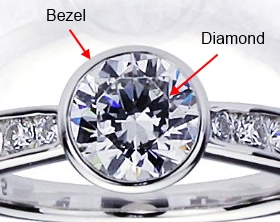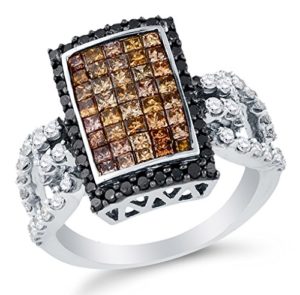Diamond rings can be classified in many ways, but the classifications used most often are by design, type of setting, shape and cut of the diamonds, and metal used to make the band. Let’s take a look at each of these types of diamond rings.
Diamond Ring Types by Design and Number of Stones
The most often seen diamond ring types are solitaire rings, rings with side stones, and pave diamond rings.
Solitaire rings are made with a single diamond in the setting, usually held by prongs, although other mountings, such as the bezel setting or tension setting, are also used.
Rings with side stones have one center diamond surrounded by smaller diamonds.
One of the most popular variations of side-stone rings is the three-stone ring, which has one center diamond and two stones on each of its sides.
Click here to see a selection of diamond ring settings and their prices.
Pave rings are studded with small diamonds attached to the band with tiny metal prongs that look like droplets of metal. Depending on its design, such a ring can be made only with small pave-set diamonds or it could feature a bigger single stone, or a center diamond with side stones.

Pave-setting diamond ring
Diamond Rings by Type of Setting
There are different types of settings used to hold a diamond in a ring, and here are the most popular ones:
Prong settings hold the diamond with metal projections, usually four or six of them, although settings with more prongs are also made.

Typical prong setting
Bezel settings surround the stone with a band of metal, fully or partially. Settings where only part of the stone’s outer edge is held by a metal band are referred to as partial bezel settings.

Round diamond in a bezel setting
Invisible settings hold diamonds in a metal framework that is underneath the stone and is not visible from the top of the ring.
Channel settings, as the name suggests, hold diamonds in a channel made in the ring’s band.

Typical channel setting containing small diamonds
Tension settings hold the diamond between the two ends of the band by applying pressure, not by using prongs, bezels, or another type of mounting device.

This is how a tension setting holds a diamond by applying pressure to it.
Diamond Rings by Diamond Shape and Cut
Diamond shape refers to the profile of the stone, while the term “diamond cut” is more specific and is used to refer to the number, shape, and alignment of the stone’s facets.
Round diamonds are by far the most popular. The classic round cut was designed to maximize the stone’s brilliance, which surpasses that of stones with other cuts.
Oval cuts are also popular, although not as much as round ones. There are other popular cuts that are derived from the oval cut: the marquise cut (whose two ends are sharp instead of rounded), the pear cut (basically an oval cut with one sharp end), and the heart cut (an oval cut with one sharp end and a cleft on the opposite rounded end).

Marquise-cut diamond

Pear-cut diamond
Rectangular cuts include the popular princess cut, the emerald cut (a rectangular cut with truncated corners) and the Asscher cut (a square emerald cut), the cushion cut (with rounded instead of sharp or cut corners), and the radiant cut.
The classic triangular cut is referred to as trillion cut, or trilliant cut. The sides of this cut’s triangular profile can be straight or slightly rounded.
Types of Diamond Rings by Metal
The most often used metals used to make diamond rings are platinum, white gold, and yellow gold.
Platinum rings are among the most popular to set diamonds in because of the color and durability of the metal.
White gold diamond rings are also very popular, as they are relatively affordable while still being pretty durable.
Yellow gold rings wear out more quickly than white gold or platinum ones, as yellow gold is relatively softer. This material is an especially good choice for diamonds of lower color grades because the yellow tints in such stones are made less visible by the yellow color of the ring.
Types of Diamond Rings by Style
Thick vs. Thin Diamond Bands
If you are selecting a ring, it is important to consider how thick its band is, for a couple of reasons:
First, along with the type of metal used, band thickness is one of the factors affecting how hard it would be to resize the ring. Thicker bands can be hard to work with, especially if they are made of a very hard metal.
Second, how thin a band is determines how quickly it will wear out or how easily it will bend. This is especially true if the band is made of a softer metal such as yellow gold.
Wide vs. Narrow Diamond Rings
Rings with bands that are too wide can make it hard for you to move your finger. Bands that are too narrow, on the other hand, can bend or break easily.
Bigger vs. Smaller Diamonds in Rings
It is important to consider the size of the diamonds in relation to the size of the ring they are attached to.
Bigger diamonds attract more attention, but you should make sure that the ring is big enough for them. Otherwise, the piece may not be well balanced and move easily when you wear it.
Smaller diamonds are cheaper per carat, but you should ensure that they are not too small for their setting. Otherwise, they may be loose and might fall off.
Where to Buy a Diamond Ring?
We recommend James Allen (read review) because you can take a 360-degree look at any stone before having it set in a ring.








